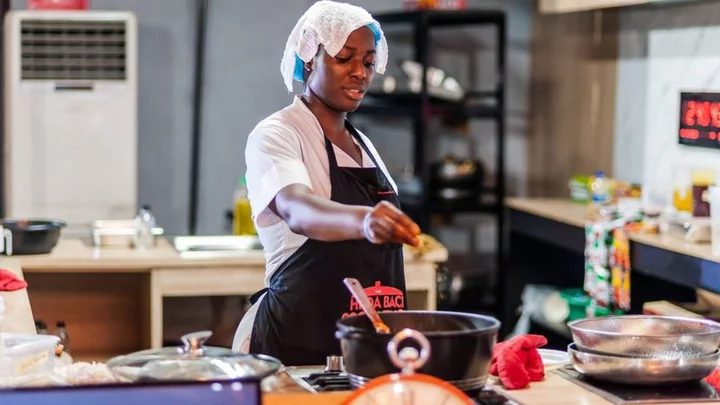
NYT Connections today: See hints and answers for September 26
Connections is the latest New York Times word game that's captured the public's attention. The
2023-09-26 10:46

Iowa Legislature considers 6-week abortion ban during a special session
Protesters are gathering at the Iowa Capitol rotunda Tuesday as the Legislature convenes a special session on abortion restrictions
2023-07-11 22:47

Hilda Baci: Guinness confirms Nigerian chef's world record
Hilda Baci caused a sensation last month after cooking non-stop for four days.
2023-06-13 19:21

Gemma Collins urges women to talk openly about incontinence
Gemma Collins has called on women to discuss the issue of incontinence more openly to dispel stigma around it. The former Towie star, 42, aims to help women overcome shame or embarrassment around the “taboo” subject in a new campaign. Collins recalled an incident when she first experienced incontinence while playing with her nephew on a trampoline. She told BBC News: “I couldn’t believe it, I was on a trampoline, you know, although I’m 42, I still think I’m 21. “And I was on – and you know, like, with your mums and your aunties, you’ve always heard growing up, ‘Oh my God, I need a pad, I’ve got leaks’ and you’re like, ‘Eugh, I will never get to that stage in my life’. “Well, honeys,” Collins continued. “It’s happening. I got on my trampoline with my nephew Hayden and I was having a great time and literally, I was laughing, I was jumping, and the leak just started happening.” Collins joked that the experience made her feel “officially old”, then added: “No, it’s nothing to do with age, so many women get it. One in three are suffering from it.” According to the NHS, urinary incontinence is the unintentional passing of urine and is believed to affect millions of people. The condition affects twice as many women as men due to pregnancy and childbirth, which can impact the bladder, urethra and other muscles supporting these organs. However, Collins said incontinence shouldn’t stop women from going out and living their lives. “Would I have stopped jumping on the trampoline? Hell, no,” she said. “It is really sad to know that women are stopping doing their activities. They might not want to go on holiday now because of their leaks. They might not want to get on a trampoline with their children or their families because of the leaks.” Collins added: “Nothing’s ever going to stop me from doing anything in my life. But why are women so embarrassed to talk about it still?” The TV personality has spoken candidly about her experiences with incontinence in the past. In 2017, she fell into a trap door in a stage while presenting the Radio One Teen Choice Awards in a moment that went viral online. But the following year, she revealed that the embarrassing moment was made worse by the fact she “wet herself” after the fall. “The worst thing about it was that I wet myself as it was such a shock,” she told OK! magazine. “James [Argent] came running down from the audience to make sure I was OK and all I could think was, ‘I hope he can’t tell I’ve wet myself’. “That hole changed my life, it catapulted me into a meme star,” she added. Read More Janey Godley shares heartbreaking cancer update Dwayne Johnson reveals he’s struggled with ‘three bouts of depression’ Manspreading remains the most misunderstood of modern evils Janey Godley shares heartbreaking cancer update Teacher, 25, rushed to hospital with stomach ache diagnosed with terminal cancer How to check if you have skin cancer: Symptoms and signs to look out
2023-05-16 20:51

Amsterdam wants ships to moor less, votes to move terminal out of city in latest hit to tourism
Amsterdam wants to move a cruise liner terminal out of the heart of the historic capital city
2023-07-21 19:21

Don't Start From Scratch: How to Back Up and Restore Your iPhone
Backing up your iPhone is always a good idea. Maybe your phone is misbehaving and
2023-08-24 02:29

8 Comfy Mattresses Designed To Keep Back Pain At Bay
After a few scrolls through our very own archive of back pain coverage, we identified a repeat offender: the mattress. While the achy among us are understandably eager to find solutions that don’t involve buying a brand new bed (see: acupuncture mats, workday desk stretches), sacrifices to your wallet must be made. So, if the time has come to invest your hard-earned cash, we found six top-reviewed mattresses to help shoulder-suffering folks sleep the pain away.
2023-06-01 05:59

The Blood Moon Lunar Eclipse In Taurus Is Here & Drama Will Follow
October 28 brings the lunar eclipse in Taurus at 4:15 p.m. ET. Not only is it the last eclipse of 2023, but it marks the end of the journey that began on January 18, 2022, when the Nodes of Destiny entered the Taurus-Scorpio lunar axis. We should use those dates to understand the themes that this eclipse will bring to our lives since they tell a similar story and theme. This period is the dramatic end to the series of eclipses on November 19, 2021, April 30, 2022, May 16, 2022, October 25, 2022, November 8, 2022, and May 5, 2023. The next time we’ll experience a series of eclipses like this will be in 2040, when the Nodes of Destiny shift into the same signs.
2023-10-27 19:23

Snag luxurious Bose headphones 700 for $80 off at Amazon right now
SAVE $80: As of August 25, the Bose headphones 700 are on sale at Amazon
2023-08-26 01:24

Amazon Now Requires Authors to Disclose AI-Generated Content
Amazon is now requiring authors who sell books through the company’s e-book program to disclose
2023-09-10 02:24

'The Exorcist: Believer' trailer sees two besties get matching possessions
A new trailer for The Exorcist: Believer is here, giving us another preview of what
2023-09-06 10:53

13 Facts About Siamese Cats
Like most cat breeds, the Siamese’s true origins are cloaked in mystery.
2023-09-10 20:55
You Might Like...

Shop the best early Prime Day smartwatch deals, including the lowest price on the Apple Watch Series 9

8 Discontinued Halloween Candies You’ll Never Find in Your Trick-or-Treat Bucket Again

The 13-inch MacBook Pro died today — and the Touch Bar is done for, too

Universal theme park in Florida plans to open new DreamWorks land with Shrek, Trolls

3 Fashion AI Tools Solving Your Personal Style Woes

10 Things Every Parent With a Connected Kid Needs to Know

Get this AI-powered photo editing software for just $80

'Quordle' today: Here are the answers and hints for August 15, 2023
